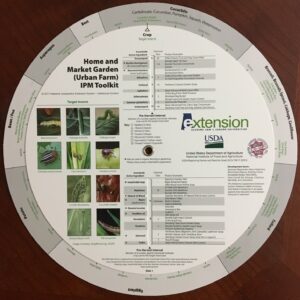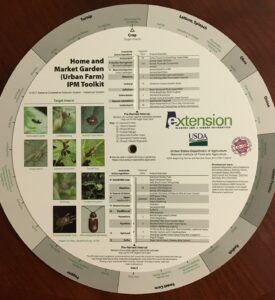Final report for SAL18-001
Project Information
Alabama SARE program is one of the fastest growing educational initiatives in the state of Alabama supported by 15 regional extension agents (REAs) and county extension coordinators (CECs) along with many technical assistance providers and crop advisers that have been instrumental in extending the training to key producers. Currently, 700 to 1000 small and beginning farmers across Alabama benefit from the program annually, mainly via in-depth workshops and high impact publications. This AU proposal aims at continuing to expand crop production and IPM training to nearly 25 REAs/CECs by organizing four SARE-funded workshops in various regions of the state (North, South, East and West AL). Some workshops will be done in cooperation with Alabama A&M and Tuskegee Universities with their extension personnel participating. These workshops will be done on the farms with high tunnel pest exclusion system demonstration that have been funded by earlier grants and continues to expand due to producer support. We also propose development and printing of a new “Urban Farm and Community Garden IPM Toolkit” as a new high impact publication that REAs can use for training events. We are also proposing an augmented reality (AR) pilot project for developing a basic, but immersive, tool for educators and beginning farmers to learn crop production and pest management through simulations. The Alabama SARE program has a Return on Investment of about 400:1 and this proposal hopes to make high impact via direct support to educators and growers through multiple communication channels.
Overall project objectives for 2018-2019: Although the Alabama SARE program emphasizes on pest management aspects, the events we organize generally incorporate crop production, irrigation, and food safety training as well. Our events are evaluated carefully for quality and impacts; these are reported annually to SARE. Following are the proposal objectives:
• Obj#1. Hands-on train-the-trainer workshop series. Conduct four organic vegetable production and IPM workshops for training extension personnel and technical assistance providers in conjunction with key farmers. These workshops will utilize the SARE-funded on-farm high tunnel IPM demonstration plots that will be easily accessible for attendees. All attendees will scout crops for pest and beneficial insect species, discuss production improvement and integrated pest management (IPM) tactics. Food safety issues have also been the focus of many recent extension trainer workshops and those will continue in 2018.
Timeline: July 2018 to Oct 2018
• Obj#2. Development of an “Urban Farm IPM Toolkit” (a wheel slide chart). Currently, there is no urban IPM toolkit for urban/semi-urban farms and community gardens. The new slide chart proposed here will include multiple turning wheels with nearly 17 crops (or crop groups) listed with 20 to 30 major pest species along with colored pictures. By turning the wheels, a producer will be able to match the crop with insects to locate an insecticide recommendation that will show up in one or two small windows. This IPM toolkit will be a great educational tool for train-the-trainer meetings with immediate utilization of the resource in the 2018 crop production season. The Urban Farm IPM Toolkit can be linked to the Augmented Reality (AR) project described below for immersive training of educators and other participants.
Timeline: July 2018 to December 2018
• Obj#3. Augmented Reality (AR) for Train-the-trainer and Grower Education. We propose initial funding for a simulated learning project that can be a new approach to information dissemination and training where extension agents and producers interact with an educational product (like the slide chart) using their smart phone. AR is also called “computer-mediated reality” where AR enhances sensory perception around real-world objects. At present, there are two very good AR software available commercially (Unity 3D and Vuforia) to develop a simple educational project. AR usage may not need special cameras; a special AR app on the smart phone and a trigger image can initiate action on the phone screen. For example, educators and beginning farmers pointing their smart phone toward insect images on the Urban Farm IPM toolkit may be able to read more details about the insect and its behavior on their screen automatically. AR content will link to other online IPM videos, e-curriculum modules, or other training materials. The possibilities of AR are endless and it can appeal to a younger generation of educators and growers as well. We will be working closely with the ACES IT and Communications Units for developing AR technology. A small panel of extension agents will assist the PI with this project as a capacity-building activity.
Timeline: December 2018 to June 2019 (AR Pilot Project)
Advisors
- (Educator)
- (Educator)
- (Educator)
- (Educator)
- (Educator)
Education
In a typical year, the Alabama SARE program at Auburn University carries out capacity building educational activities for extension educators, crop advisers, and key farmers. Our educational approaches for capacity building includes: 1.) Field demonstrations on research stations and commercial specialty crop farms; 2.) SARE and Extension bulletins; 3.) Digital content (videos, social media channels, phone app, etc.).
Education & Outreach Initiatives
Field day to train regional extension agents/field advisers/key farmers on crop production and pest management advances
Field day to train regional extension agents/field advisers/key farmers on crop production and pest management advances. All personnel are shown crops and provided handouts funded by SARE program.
100% increase in awareness of current pest management challenges and scouting practices; over 50% increase in knowledge of sustainable agriculture and organic IPM practices based on practical training from 2 events.
Designed, printed, and distributed over 2,000 copies of the Urban Farm/Market Garden IPM Toolkit
Previously, there was no urban IPM toolkit for urban/semi-urban farms and community gardens. The new wheel slide chart includes multiple turning wheels with nearly 17 crops (or crop groups) listed with 30 major pest species along with colored pictures. By turning the wheels, educators and producer can to match the crop with insects to locate an organic insecticide recommendation that shows up in two small windows.
This IPM toolkit is a great educational tool for train-the-trainer meetings with immediate utilization of the resource. We had to print and distribute over 2,000 copies of the slide chart due to demand. The publication mentions SARE as funding source.
Educational & Outreach Activities
Participation Summary:
Learning Outcomes
Project Outcomes
Face of SARE
Alabama SARE website is a well-known and utilized resource for producers and educators. The PI keeps it up-to-date with help from Ms. Candace Pollock at UGA. Factsheets and educational videos are regularly added to the ‘Resources’ tab. We have recently added a training module on the high tunnel pest exclusion system which is receiving wide publicity (click for details). The Alabama SARE website is also interlinked with three other websites that the PI maintains resulting in wide publicity and usage. We put a lot of effort in program publicity in order to promote participation from educators and small producers without bias.

